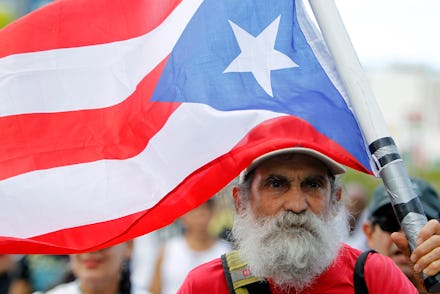Puerto Ricans didn't vote for statehood. They voted for inaction and disrespect.

While the United States remains obsessed with whether its democracy was compromised during last year's presidential election, America the Hypocrite continues its anti-democratic ways to blatantly ignore the colony of Puerto Rico.
The embarrassments of 19th-century manifest destiny are still thriving in the 21st century "territory," a spoil from the 1898 Spanish American War. Treated since 1917 like second-class U.S. citizens and subjected to taxation without representation in Congress, Puerto Ricans have fought and died in every major U.S. war since its annexation — but when it comes to the land of the free finally stepping up and resolving Puerto Rico's colonial status, Americans lack the political knowledge and guts to focus on the lives of 3.5 million of their fellow citizens with no voice in the decision-making processes.
Yet despite the apathy and the widespread ignorance — 41% of mainland Americans, for example, have no clue Puerto Ricans hold U.S. passports — there has been a 50-year-push by Puerto Ricans to take the political status fight to its colonial master.
And for 50 years, this fight has failed miserably.
The latest attempt happened Sunday, when Boricuas went to the polls to determine in a nonbinding plebiscite (the fifth one in five decades) how they want to define their relationship with the United States. Voters were asked if they should push to become the 51st state of the union, an independent nation or remain under the current territorial status — an option already rejected in 2012 and the cause of a massive debt problem that led to a looming austerity program imposed by a federal fiscal control board.
While headlines claimed 97% of Puerto Ricans chose statehood, only 23% of the island actually showed up. And, as with anything regarding Puerto Rico and the U.S., it is way more complicated than that.
The island's pro-statehood governor, Ricardo Rosselló, and his allies had initially wanted this latest plebiscite to be different and offer only two choices. The 2012 rejection of the status quo opened up a historic opportunity to get Puerto Ricans to finally make a clear decision and not hide behind the colony: Do you want to become a state, or do you want to become independent? The ambivalent defense of a status quo wasn't even then on the table.
But then Jeff Sessions' Justice Department intervened in April and said Rosselló had to include the status quo option — or else federal dollars to help fund the plebiscite would be withheld and the plebiscite itself would not get a federal blessing. So, the colonized Rosselló gave in to the colonizer, even after the DOJ said it would have approved the plebiscite ballot had Rosselló simply delayed the vote. As a result, opponents derided the vote in favor of statehood as "fake news" even before it happened.
The resistance has been bolstered by a boycott from statehood opponents, who say it shows how much of a farce the vote really was. But, of course, by not participating in the vote, statehood opponents ironically gave the statehood proponents the rationale they needed to keep their American Dream alive.
Rosselló can now cite the 97% figure in favor of statehood in Puerto Rico and Washington, D.C., and he can crow that non-statehood supporters lost. Forfeiting the game means you lost, right? Why didn't statehood opponents call Rosselló on his bluff and vote on Sunday? A lot of the argument in favor of statehood over independence or the status quo wouldn't be so clear-cut if others had showed up to the polls.
The win for statehood also gave Rosselló the mandate to have his team begin working on a "Tennessee Plan," a strategy inspired by Tennessee's move into statehood, when it sent its own representatives to literally demand a place in Congress. This is what Rosselló plans on doing: sending five "congressmen" and two "senators" to D.C. — and he's in D.C. Wednesday to start the process.
Imagine seven Puerto Ricans asking to be admitted into Congress as full members in the age of Trump, when "Make America Great Again" is more like "Make America White and Only English-Speaking Again." The push for a mostly Spanish-speaking state in a Republican-controlled Congress is illogical.
There are already clues from Trump's right-wing base that Puerto Rico's quest for statehood will be attacked by racists and xenophobes. Rosselló's attempt to promote Puerto Rico as the "first Hispanic state" will only lead to more and more Americans cutting down Puerto Ricans than propping them up. But what do you expect from a governor — a Democrat — who doesn't think Trump is anti-Latino?
Ultimately, Puerto Rico remains on the hamster wheel with no end in sight: While statehood has won the last two plebiscites, over 830,000 voted for it in 2012 and only about 509,000 voted in 2017. Thus, it's hard to conclude these results really reflect the will of the Puerto Rican people. For instance, just as many people voted for either commonwealth or independence in 2012 as voted for statehood in 2017.
The statehood party's arrogance to not work with the federal government and establish a more inclusive process pretty much allows the U.S. to wash its hands of the issue and keep kicking its hypocrisy-can down the road. The White House already passed on dealing with the issue, and it's doubtful Congress will do anything except have individual representatives issue statements and introduce statehood bills that won't come up for a vote.
The infighting between statehooders, commonwealthers and independence supporters allows the U.S. to remain unaccountable: If Puerto Ricans can’t resolve their differences, why should the U.S. even care? Besides, it's not like American bondholders aren't trying to collect on their debt.
That is what 50 years of status politics has given Puerto Rico. No progress. No action. No respect.
There has to be a better way, but no one seems to be interested in finding one.